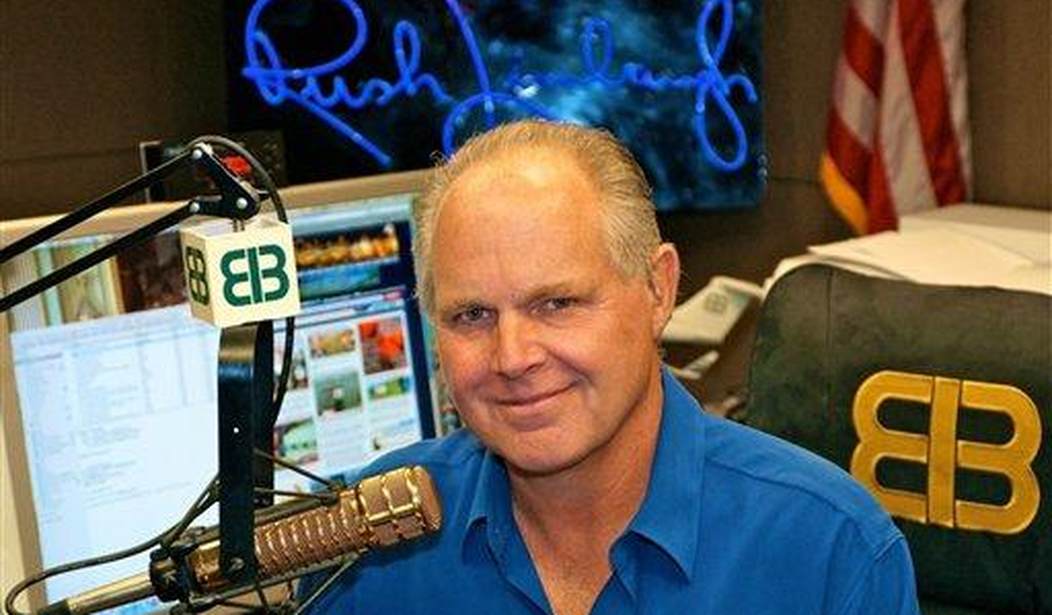George F. Will once said that without William F. Buckley there would have been no National Review; without National Review, no Goldwater; without Goldwater, no Reagan; and without Reagan, no fall of the Berlin Wall. Ergo, William F. Buckley ushered in the collapse of the Soviet Union. Today we might draw a direct line from Rush Limbaugh, to Donald Trump, and from Donald Trump to the remaking of the conservative movement, and from the remaking of the conservative movement to... we’ll have to see.
What will their legacy be? We would like to hope it will include free speech.
Limbaugh credited his rise to the Radio Hall of Fame to Reagan’s repeal of the ironically-named “fairness doctrine.” In his book The Radio Right: How a Band of Broadcasters Took on the Federal Government and Built the Modern Conservative Movement, Paul Matzko documents the sordid history of how this archaic but powerful principle of federal broadcast law was effectively weaponized against free speech and conservative talk radio. Beginning in the Kennedy administration, an FCC (formerly FRC) policy known as the Cullman Doctrine forced radio stations to grant equal time to opposing viewpoints, free of charge if the respondents said they couldn’t pay. This nearly crushed what remained of the “radio right” following the ascent of the big television networks like NBC and CBS (no surprise that most respondents demanding equal time on conservative stations said they couldn’t pay).
Reagan’s repeal of the fairness doctrine, along with the amendment of the Cullman Doctrine, rescued conservative talk radio, and paved the way for a revival of the industry. By the 1990s, Limbaugh found himself at the center of virtually every major AM station lineup. His ratings – in the tens of millions weekly – dwarfed cable news and achieved a less visible but far more widespread influence over the discourse than print and TV combined.
Recommended
Now, having enjoyed decades of talk radio commercial success, conservatives are again in danger of forgetting the lesson of the vulnerability of free speech in the media. This experience from the second half of the 20th century shows us that the government should not bring back any “fairness doctrine” type regulation to social or any other media. Until Reagan, Kennedy and the presidents who followed were able to use this pernicious doctrine to silence the voices of their political opponents in the name of the public interest. Informed voters should be alert enough to inquire as to which segment of the “public” the government has in mind.
Today, social media censorship presents a challenge to conservatives. The temptation for the likes of Senators Josh Hawley and Ted Cruz, is to propose neo-fairness doctrine regulations to prevent Facebook, Twitter and other social media platforms from silencing conservative dissent. Facebook and Twitter are private actors – much like the silenced radio stations of the 1960s – and as such, they may permit or deny anyone they choose access to their property. That is the very meaning of “ property rights”.
Historians such as Matzko acknowledge that Kennedy’s suppression of conservative voices was effective. Thanks to the muzzling of his strongest critics JFK’s popularity didn’t suffer in the aftermath of several embarrassing scandals and unpopular positions, since they were under-reported by the TV and print media.
Unlike Trump, who threatened but did not attack social media, Kennedy employed tax audits and “enhanced regulatory scrutiny” to effectively silence his enemies. He went so far as to secretly fund front groups that exploited the fairness doctrine to the detriment of conservative media. These actions, among others, led Matzko to write that “John F. Kennedy Did What Donald Trump Only Wishes He Could Do.”
While Trump’s restraint in not bringing antitrust suits or using other measures against Big Tech may have contributed to his loss in 2020, it did preserve the free-speech which is the essence of the internet. Social media is, at least for now, free to air whatever viewpoints they choose, and dissenters are free to create their own competing platforms, or of course continue to take advantage of the always-reliable AM broadcasting.
Most importantly, the precedent of regulating “fairness” in the media has not been re-established for the new Biden administration to wield against conservatives in their last remaining bastions of talk radio and the internet. Had social media companies been forced to rebrand themselves as “publishers” rather than “platforms” under Section 230, the crackdown on conservative and other dissenting ideas would have likely gotten worse. It is worth noting that the day after Limbaugh’s passing, eight of the top-performing links on Facebook were from right-of-center publications – no doubt spurred on by the outpouring of condolences and memorials for the late radio giant.
Talk radio remains free because of President Reagan’s repeal of the fairness doctrine. Perhaps historians will include in Trump’s legacy the refusal to enforce a 21st-century equivalent of the fairness doctrine on the internet. And so we might update George Will’s mantra to read: No Rush, no Trump; no Trump, no free Internet. Let us hope so.

























Join the conversation as a VIP Member